Christian Ufrecht
Fraunhofer-IIS, Fraunhofer Institute for Integrated Circuits IIS, Division Positioning and Networks, Nuremberg, Germany
CutReg: A loss regularizer for enhancing the scalability of QML via adaptive circuit cutting
Jun 17, 2025Abstract:Whether QML can offer a transformative advantage remains an open question. The severe constraints of NISQ hardware, particularly in circuit depth and connectivity, hinder both the validation of quantum advantage and the empirical investigation of major obstacles like barren plateaus. Circuit cutting techniques have emerged as a strategy to execute larger quantum circuits on smaller, less connected hardware by dividing them into subcircuits. However, this partitioning increases the number of samples needed to estimate the expectation value accurately through classical post-processing compared to estimating it directly from the full circuit. This work introduces a novel regularization term into the QML optimization process, directly penalizing the overhead associated with sampling. We demonstrate that this approach enables the optimizer to balance the advantages of gate cutting against the optimization of the typical ML cost function. Specifically, it navigates the trade-off between minimizing the cutting overhead and maintaining the overall accuracy of the QML model, paving the way to study larger complex problems in pursuit of quantum advantage.
Optimizing Quantum Circuits via ZX Diagrams using Reinforcement Learning and Graph Neural Networks
Apr 04, 2025Abstract:Quantum computing is currently strongly limited by the impact of noise, in particular introduced by the application of two-qubit gates. For this reason, reducing the number of two-qubit gates is of paramount importance on noisy intermediate-scale quantum hardware. To advance towards more reliable quantum computing, we introduce a framework based on ZX calculus, graph-neural networks and reinforcement learning for quantum circuit optimization. By combining reinforcement learning and tree search, our method addresses the challenge of selecting optimal sequences of ZX calculus rewrite rules. Instead of relying on existing heuristic rules for minimizing circuits, our method trains a novel reinforcement learning policy that directly operates on ZX-graphs, therefore allowing us to search through the space of all possible circuit transformations to find a circuit significantly minimizing the number of CNOT gates. This way we can scale beyond hard-coded rules towards discovering arbitrary optimization rules. We demonstrate our method's competetiveness with state-of-the-art circuit optimizers and generalization capabilities on large sets of diverse random circuits.
Benchmarking Quantum Reinforcement Learning
Jan 27, 2025Abstract:Benchmarking and establishing proper statistical validation metrics for reinforcement learning (RL) remain ongoing challenges, where no consensus has been established yet. The emergence of quantum computing and its potential applications in quantum reinforcement learning (QRL) further complicate benchmarking efforts. To enable valid performance comparisons and to streamline current research in this area, we propose a novel benchmarking methodology, which is based on a statistical estimator for sample complexity and a definition of statistical outperformance. Furthermore, considering QRL, our methodology casts doubt on some previous claims regarding its superiority. We conducted experiments on a novel benchmarking environment with flexible levels of complexity. While we still identify possible advantages, our findings are more nuanced overall. We discuss the potential limitations of these results and explore their implications for empirical research on quantum advantage in QRL.
Warm-Start Variational Quantum Policy Iteration
Apr 16, 2024Abstract:Reinforcement learning is a powerful framework aiming to determine optimal behavior in highly complex decision-making scenarios. This objective can be achieved using policy iteration, which requires to solve a typically large linear system of equations. We propose the variational quantum policy iteration (VarQPI) algorithm, realizing this step with a NISQ-compatible quantum-enhanced subroutine. Its scalability is supported by an analysis of the structure of generic reinforcement learning environments, laying the foundation for potential quantum advantage with utility-scale quantum computers. Furthermore, we introduce the warm-start initialization variant (WS-VarQPI) that significantly reduces resource overhead. The algorithm solves a large FrozenLake environment with an underlying 256x256-dimensional linear system, indicating its practical robustness.
Qiskit-Torch-Module: Fast Prototyping of Quantum Neural Networks
Apr 09, 2024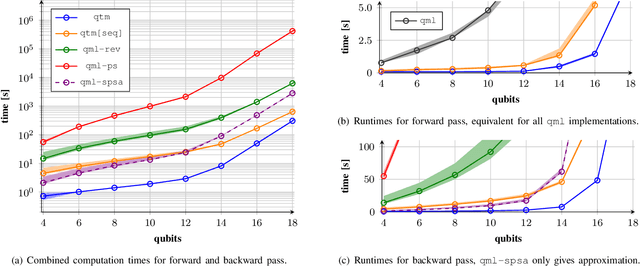
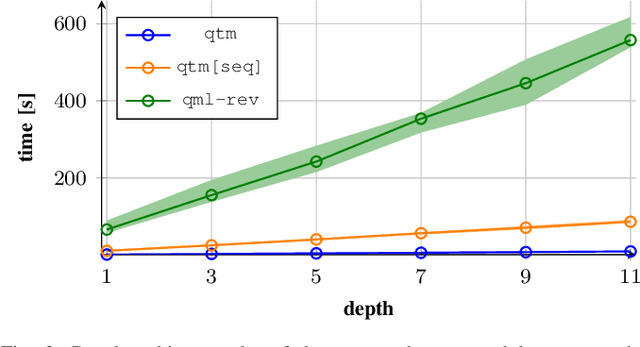
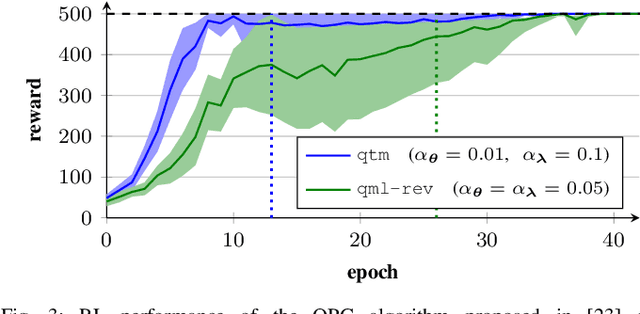
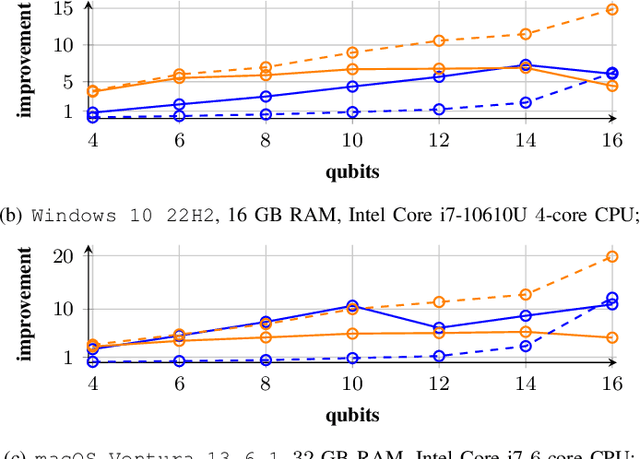
Abstract:Quantum computer simulation software is an integral tool for the research efforts in the quantum computing community. An important aspect is the efficiency of respective frameworks, especially for training variational quantum algorithms. Focusing on the widely used Qiskit software environment, we develop the qiskit-torch-module. It improves runtime performance by two orders of magnitude over comparable libraries, while facilitating low-overhead integration with existing codebases. Moreover, the framework provides advanced tools for integrating quantum neural networks with PyTorch. The pipeline is tailored for single-machine compute systems, which constitute a widely employed setup in day-to-day research efforts.
An Empirical Comparison of Optimizers for Quantum Machine Learning with SPSA-based Gradients
Apr 27, 2023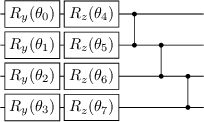
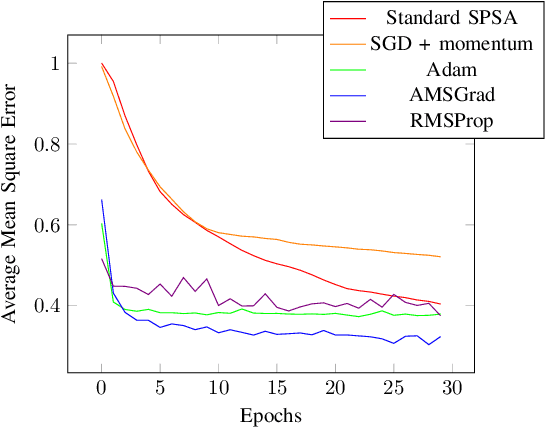
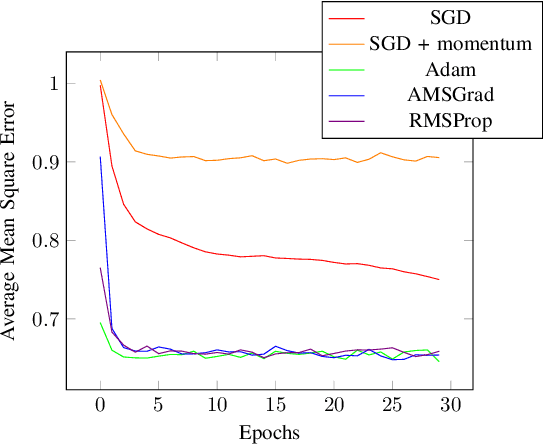

Abstract:VQA have attracted a lot of attention from the quantum computing community for the last few years. Their hybrid quantum-classical nature with relatively shallow quantum circuits makes them a promising platform for demonstrating the capabilities of NISQ devices. Although the classical machine learning community focuses on gradient-based parameter optimization, finding near-exact gradients for VQC with the parameter-shift rule introduces a large sampling overhead. Therefore, gradient-free optimizers have gained popularity in quantum machine learning circles. Among the most promising candidates is the SPSA algorithm, due to its low computational cost and inherent noise resilience. We introduce a novel approach that uses the approximated gradient from SPSA in combination with state-of-the-art gradient-based classical optimizers. We demonstrate numerically that this outperforms both standard SPSA and the parameter-shift rule in terms of convergence rate and absolute error in simple regression tasks. The improvement of our novel approach over SPSA with stochastic gradient decent is even amplified when shot- and hardware-noise are taken into account. We also demonstrate that error mitigation does not significantly affect our results.
Incremental Data-Uploading for Full-Quantum Classification
May 06, 2022



Abstract:The data representation in a machine-learning model strongly influences its performance. This becomes even more important for quantum machine learning models implemented on noisy intermediate scale quantum (NISQ) devices. Encoding high dimensional data into a quantum circuit for a NISQ device without any loss of information is not trivial and brings a lot of challenges. While simple encoding schemes (like single qubit rotational gates to encode high dimensional data) often lead to information loss within the circuit, complex encoding schemes with entanglement and data re-uploading lead to an increase in the encoding gate count. This is not well-suited for NISQ devices. This work proposes 'incremental data-uploading', a novel encoding pattern for high dimensional data that tackles these challenges. We spread the encoding gates for the feature vector of a given data point throughout the quantum circuit with parameterized gates in between them. This encoding pattern results in a better representation of data in the quantum circuit with a minimal pre-processing requirement. We show the efficiency of our encoding pattern on a classification task using the MNIST and Fashion-MNIST datasets, and compare different encoding methods via classification accuracy and the effective dimension of the model.
Uncovering Instabilities in Variational-Quantum Deep Q-Networks
Feb 10, 2022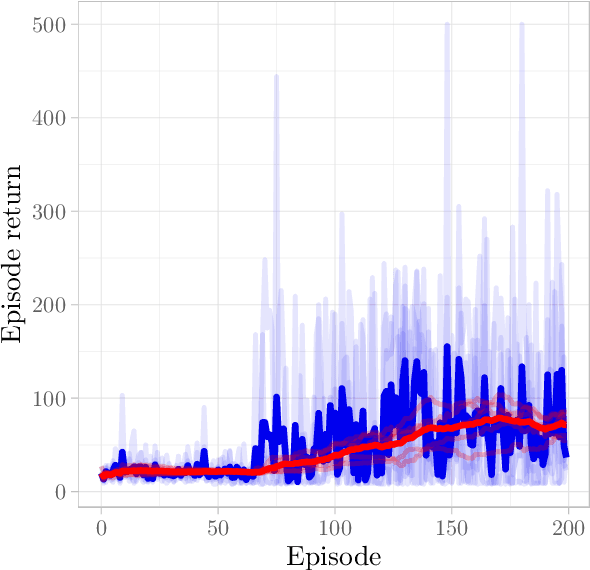
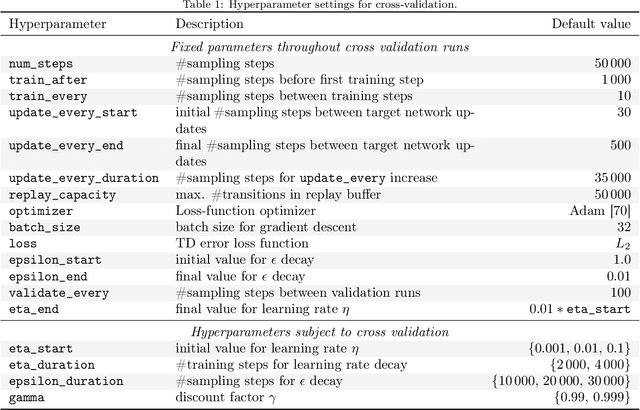
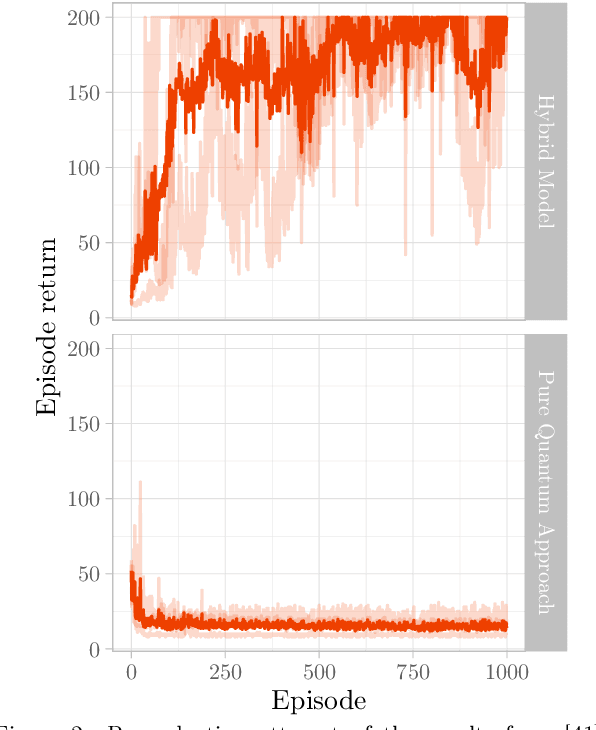
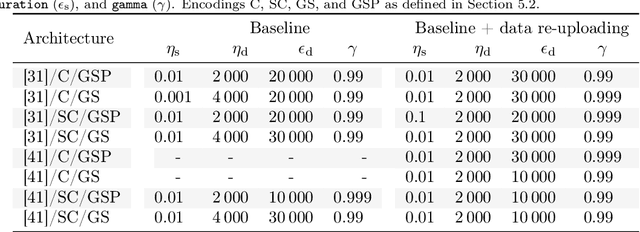
Abstract:Deep Reinforcement Learning (RL) has considerably advanced over the past decade. At the same time, state-of-the-art RL algorithms require a large computational budget in terms of training time to converge. Recent work has started to approach this problem through the lens of quantum computing, which promises theoretical speed-ups for several traditionally hard tasks. In this work, we examine a class of hybrid quantumclassical RL algorithms that we collectively refer to as variational quantum deep Q-networks (VQ-DQN). We show that VQ-DQN approaches are subject to instabilities that cause the learned policy to diverge, study the extent to which this afflicts reproduciblity of established results based on classical simulation, and perform systematic experiments to identify potential explanations for the observed instabilities. Additionally, and in contrast to most existing work on quantum reinforcement learning, we execute RL algorithms on an actual quantum processing unit (an IBM Quantum Device) and investigate differences in behaviour between simulated and physical quantum systems that suffer from implementation deficiencies. Our experiments show that, contrary to opposite claims in the literature, it cannot be conclusively decided if known quantum approaches, even if simulated without physical imperfections, can provide an advantage as compared to classical approaches. Finally, we provide a robust, universal and well-tested implementation of VQ-DQN as a reproducible testbed for future experiments.
 Add to Chrome
Add to Chrome Add to Firefox
Add to Firefox Add to Edge
Add to Edge